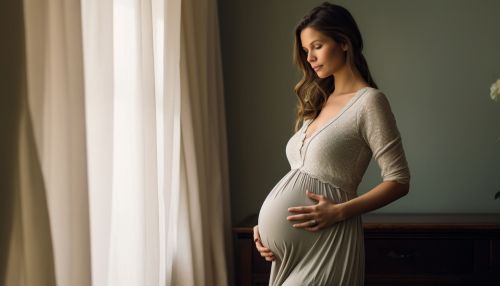Pregnancy
Overview
Pregnancy is a biological process in which a new individual is developed inside the body of a female organism. In mammals, including humans, it begins with the fertilization of an egg by a sperm, and ends with the birth of a live offspring. The term is typically used in reference to human gestation, which lasts approximately 40 weeks from the last menstrual period (LMP) to birth.


Physiology of Pregnancy
Pregnancy involves numerous physiological changes that allow for the development and growth of the fetus, as well as prepare the mother's body for childbirth and lactation. These changes are driven by a complex interplay of hormones, including hCG, Progesterone, and Estrogen.
Hormonal Changes
The hormonal changes begin immediately after fertilization. The fertilized egg, or Zygote, begins to secrete hCG, which signals the body to maintain the Corpus luteum. This structure, which is formed in the ovary after ovulation, produces progesterone to prevent the shedding of the uterine lining, or Endometrium, thus ensuring its suitability for implantation of the fertilized egg.
Implantation
About a week after fertilization, the zygote has developed into a Blastocyst, and it implants itself into the endometrium. This process, known as implantation, is critical for the establishment of the Placenta, which will serve as the interface for the exchange of nutrients, gases, and wastes between the mother and the fetus.
Development of the Fetus
Following implantation, the blastocyst develops into an Embryo, and later into a Fetus. This development is characterized by rapid cell division and differentiation, leading to the formation of various organs and body systems. The growth and development of the fetus are closely monitored during prenatal care through the use of ultrasound imaging.
Stages of Pregnancy
Pregnancy is typically divided into three trimesters, each lasting about three months. Each trimester is associated with specific developmental milestones and physiological changes in the mother's body.
First Trimester
The first trimester encompasses the first 12 weeks of pregnancy. During this period, the fertilized egg develops into a fetus. The most critical organ development occurs during this period, making it a crucial window for fetal health.
Second Trimester
The second trimester spans weeks 13 to 28 of pregnancy. During this period, the fetus continues to grow and develop, and the mother may begin to feel fetal movements, a phenomenon known as quickening.
Third Trimester
The third trimester, from week 29 to birth, is characterized by the final growth and maturation of the fetus. During this period, the mother's body prepares for childbirth, a process known as parturition.
Prenatal Care
Prenatal care is the healthcare provided to a woman during pregnancy. It includes regular check-ups with a healthcare provider, screening tests, and lifestyle recommendations to ensure the health of both the mother and the fetus.
Complications of Pregnancy
While pregnancy is a natural process, it can be associated with various complications that can affect the health of the mother, the fetus, or both. These include Gestational diabetes, Preeclampsia, and Preterm labor.
Childbirth
Childbirth marks the end of pregnancy. It involves three stages: the dilation of the cervix, the delivery of the baby, and the delivery of the placenta. Childbirth can occur through a vaginal delivery or a Caesarean section.
Postpartum Period
The postpartum period, also known as the puerperium, begins immediately after childbirth and lasts for about six weeks. During this period, the mother's body undergoes several physiological changes as it returns to its non-pregnant state.
